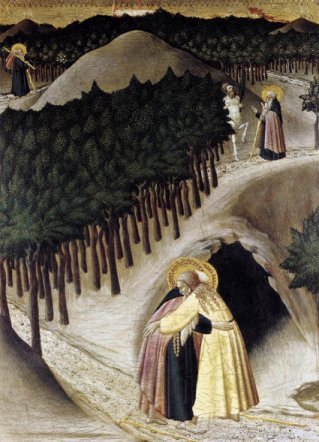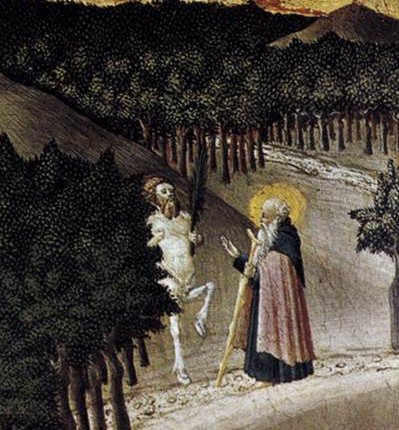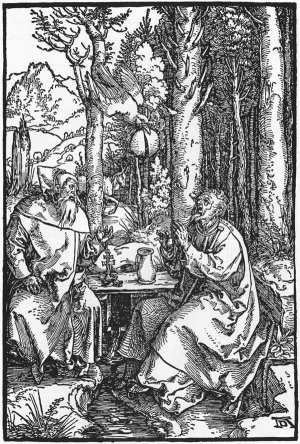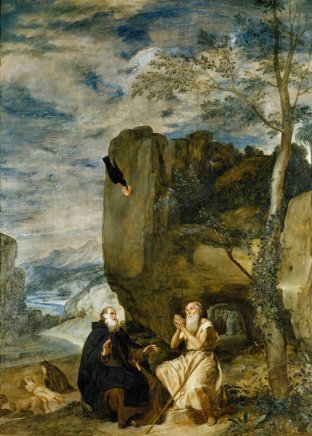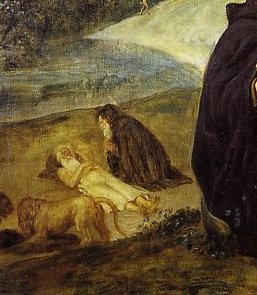|
Saint Anthony |
|
|
|
|
|
Athanasasius does not mention the meeting of Anthony and
Paul the Hermit, probably
because it almost certainly never happened. The source of the story
comes from St. Jerome's Life of Paulus the First Hermit. The
story was picked up by Jacobus de Voragine and included in the Golden
Legend entry about St Paul. Anna Jameson in Sacred and
Legendary Art, Volume 2 tells us that Jerome met Anthony in Egypt,
but this is impossible: Jerome's visit to Alexandria came after 385, by
which time Anthony had been dead for twenty years or more. Even in Jerome's day people doubted the veracity of the story, and suggested that Paul never existed, much to Jerome's fury. It's an odd tale. For the full version, click here. At the age of ninety Anthony had a dream that there was a desert hermit even older than he was, who had been in the desert even longer than he had. On waking, he decided he had to go and see the 118 year-old for himself. |
|
|
|
|
|
Anthony met some very strange creatures on the way: 'All at once he beholds a creature of mingled shape, half horse half man, called by the poets Hippocentaur. At the sight of this he arms himself by making on his forehead the sign of salvation, and then exclaims, “Holloa! Where in these parts is a servant of God living?” The monster after gnashing out some kind of outlandish utterance, in words broken rather than spoken through his bristling lips, at length finds a friendly mode of communication, and extending his right hand points out the way desired. Then with swift flight he crosses the spreading plain and vanishes from the sight of his wondering companion. But whether the devil took this shape to terrify him, or whether it be that the desert which is known to abound in monstrous animals engenders that kind of creature also, we cannot decide.' (Jerome, Life of Paul the Hermit, Ch. 8) This is not the only one. Later, He encounters a creature with 'hooked snout, horned forehead, and extremities like goats’ feet.' A satyr! It turned out to be friendly, and Anthony stopped for a chat. At this point Jerome was aware of potential scepticism and reported that the preserved body of such a creature had been on display in Alexandria, and indeed had later been taken to Antioch. Eventually, St Anthony reached St Paul, and after some misunderstanding (St Paul wouldn't let him in) they embraced. Lunch was a problem; Paul hadn't expected a visitor. Luckily, the raven that delivered Paul's food did know: 'Thus conversing they noticed with wonder a raven which had settled on the bough of a tree, and was then flying gently down till it came and laid a whole loaf of bread before them. They were astonished, and when it had gone, “See,” said Paul, “the Lord truly loving, truly merciful, has sent us a meal. For the last sixty years I have always received half a loaf: but at your coming Christ has doubled his soldier’s rations." ' (Life of Paul the Hermit, Ch. 10) |
|
|
|
|
| What's going on
in the background of Velasquez's picture? The tale gets even more
involved at this point. Anthony has no sooner arrived back home when he
has a vision of St Paul on his way to paradise. Rushing back, he finds
the body of St Paul. He realises that he does not have a spade to bury
him but, luckily, a couple of lions turn up and give him a hand - here
they are busily digging away. |
|
|
|
|
| One is beginning to see why the credulity of Jerome's readers became just a little strained. | |
|
|
|
